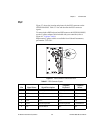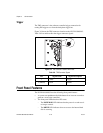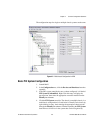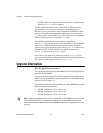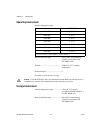
Chapter 4 Common Configuration Questions
NI PXI-8184/8185 User Manual 4-6 ni.com
NI-VISA. When your controller and all your chassis are identified, the
required
pxisys.ini file is complete.
The PXI specification allows many combinations of PXI chassis and
system modules. To assist system integrators, the manufacturers of
PXI chassis and system modules must document the capabilities of their
products. The minimum documentation requirements are contained in
.ini files, which consist of ASCII text. System integrators, configuration
utilities, and device drivers can use these
.ini files.
The capability documentation for the chassis is contained in a
chassis.ini file provided by the chassis manufacturer. The information
in this file is combined with information about the system controller to
create a single system initialization file called
pxisys.ini (PXI System
Initialization). The NI PXI-8184/8185 uses MAX to generate the
pxisys.ini file from the chassis.ini file.
Device drivers and other utility software read the
pxisys.ini file to
obtain system information. For detailed information regarding initialization
files, refer to the PXI specification at
www.pxisa.org.
Upgrade Information
How do I upgrade system memory?
You can change the amount of installed RAM on the NI PXI-8184/8185 by
upgrading the SO-DIMM.
To upgrade the RAM, remove the NI PXI-8184/8185 from the PXI chassis.
Remove the old SO-DIMM module and install the new SO-DIMM in the
socket as shown in Figure 4-3.
National Instruments offers the following types of SO-DIMMs for use with
the NI PXI-8184/8185 controller.
• 128 MB, 16 MB × 64, 7.5 ns, 1.05 in. max
• 256 MB, 32 MB × 64, 7.5 ns, 1.05 in. max
• 512 MB, 64 MB × 64, 7.5 ns, 1.05 in. max
Note National Instruments has tested and verified that the SO-DIMMs we sell work with
the NI PXI-8184/8185. We recommend you purchase your SO-DIMM modules from
National Instruments. Other off-the-shelf SO-DIMM modules are not guaranteed to work
properly.



